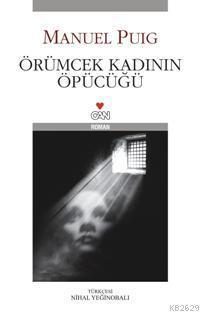What do you think?
Rate this book


272 pages, Paperback
First published January 1, 1976
…when they switch on a strong spotlight, the appearance of such a strange woman, with a long dress on, that’s shining, ‘Silver lamé, that fits her like a glove?’ yes, ‘And her face?’ she’s wearing a mask, it’s also silver, but… poor creature… she can’t move, there in the deepest part of the jungle she’s trapped in a spider’s web, or no, the spiderweb is growing out of her own body, the threads are coming out of her waist and her hips, they’re part of her body, so many threads that look hairy like ropes and disgust me, even though if I were to touch them they might feel as smooth as who knows what, but it makes me queasy to touch them, ‘Doesn’t she speak?’ no, she’s crying, or no, she isn’t, she’s smiling but a tear rolls out from beneath the mask…
”Vos sos la mujer araña, que atrapa a los hombres en su tela”.Hay frases que se quedan incrustadas en la memoria. Esta es una de ellas, y no es para menos. Porque lo que hace El beso de la mujer araña no es solo atraparte: te envuelve, te hipnotiza y te deja pensando mucho después de que hayas cerrado el libro. ¿Por qué? Porque Manuel Puig no escribe con tinta, escribe con las entrañas.
“Vediamo... rispondimi. Cos'è essere uomo per te?”
“Uhm... non lasciarmi mettere sotto i piedi... da nessuno, neanche dal potere... No, è ancora di più. Non lasciarsi mettere sotto i piedi è un'altra cosa, non è questa la più importante. Essere uomo è molto di più, è non umiliare nessuno, con un ordine, con una mancia. È di più, è... non permettere che nessuno vicino a te si senta inferiore, che nessuno vicino a te debba soffrire.”
”E cosa c’è di male se uno è debole come una donna? Perché un uomo o chiunque, un cane, o una checca, non può essere sensibile se ne ha voglia”
“Non so, ma a un uomo esagerare in quel senso può essere di ostacolo”
“Per cosa? Per torturare?”
“No, per farla finita con i torturatori��


